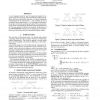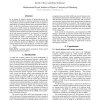1291 search results - page 20 / 259 » Learning a language model from continuous speech |
123
click to vote
COST
2007
Springer
15 years 8 months ago
2007
Springer
The organization of a computational control model of articulatory speech synthesis is outlined in this paper. The model is based on general principles of neurophysiology and cognit...
120
click to vote
ICASSP
2011
IEEE
14 years 5 months ago
2011
IEEE
One of the difficulties in second language (L2) learning is the weakness in discriminating between acoustic diversity within an L2 phoneme category and between different categori...
CORR
2000
Springer
15 years 1 months ago
2000
Springer
A new language model for speech recognition inspired by linguistic analysis is presented. The model develops hidden hierarchical structure incrementally and uses it to extract mea...
121
click to vote
MLMI
2007
Springer
15 years 8 months ago
2007
Springer
Abstract. Prosody has been actively studied as an important knowledge source for speech recognition and understanding. In this paper, we are concerned with the question of exploiti...
123
click to vote
INTERSPEECH
2010
14 years 8 months ago
2010
In an attempt to improve models of human perception, the recognition of phonemes in nonsense utterances was predicted with automatic speech recognition (ASR) in order to analyze i...


